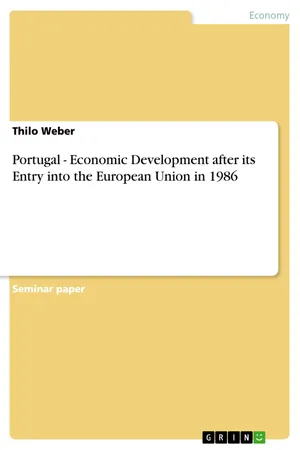
Portugal - Economic Development after its Entry into the European Union in 1986
- 27 pages
- English
- PDF
- Available on iOS & Android
Portugal - Economic Development after its Entry into the European Union in 1986
About this book
Seminar paper from the year 2002 in the subject Economics - Foreign Trade Theory, Trade Policy, grade: 1, 1 (A), BVL Campus gGmbH (Transport Economics-Logistics), course: Business, language: English, abstract: [...] The revolution in 1974 was the beginning of dramatic political, economical and social changes in the country. In 1986, when Portugal became a member ofthe European Community (now European Union), the economy began to grow even fasterthan it had been the case in the years before. "Portugal´s GDP per capita, which had been only53 percent of the EU average in 1985, has now risen to more than 70% of the EU average by1997."1As I was living in Portugal´s capital Lisbon from 1984 until 1989, I personally experiencedthese great changes. I can remember that, e.g., chocolate was not known in Portugal until1986. I also remember narrow roads which were in an extremely bad condition. Tramwaysand busses made me feel like in the 19th century. Furthermore, there were a lot of huts, particularly in the northern and in the eastern Lisbon periphery which I passed every morningon my way to school. These huts, in which mostly people from the former Portuguesecolonies were living, disappeared between 1986 and 1990.Also the infrastructure was getting better and better. Many new roads and motorways werebuilt, the tramway- and underground-system was modernised, big shopping- malls were builtand you could suddenly buy almost everything (Haribo-Gummibärchen were sold in Portugalin 1986 for the first time and I guess I was the only one who bought them…)Beside these positive changes I also recognised, that people have changed their behavioursince the 1980´s. When I arrived to Portugal with my family in 1984 the Portuguese seemedto be friendlier than any people I had met before and time did not seem to be important tothem at all. People were just living somehow, many of them were happy, some were not butnobody really complained about the fact that Portugal was the poorest country in the westernpart of the European continent. Of course, the Portuguese are still very friendly, but in myopinion the difference between the busy and hectic Central Europeans and the Portuguese hasbecome smaller. It is also quiet obvious that today the Portuguese do everything they can toimprove the economic situation and the standard of living. Portugal wants to catch up. Italready has caught up enormously in the past 15 years and I am sure that this positivedevelopment will continue in the future.1Department of State, UnitedStatesofAmerica, Portugal 2000: Country Commercial Guide, http://www.state.gov/www/about_state/business/com_guides/2000/europe/portugal00_02.html, 27/06/02
Frequently asked questions
- Essential is ideal for learners and professionals who enjoy exploring a wide range of subjects. Access the Essential Library with 800,000+ trusted titles and best-sellers across business, personal growth, and the humanities. Includes unlimited reading time and Standard Read Aloud voice.
- Complete: Perfect for advanced learners and researchers needing full, unrestricted access. Unlock 1.4M+ books across hundreds of subjects, including academic and specialized titles. The Complete Plan also includes advanced features like Premium Read Aloud and Research Assistant.
Please note we cannot support devices running on iOS 13 and Android 7 or earlier. Learn more about using the app.